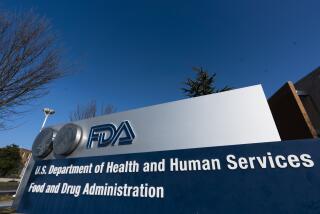Customizing cancer care
- Share via
WHEN a woman first gets diagnosed with breast cancer, she wants to know how bad it is and what the best therapy is for her. Unfortunately, that’s often more than modern medicine can tell her.
While pathologists can distinguish cancerous cells from healthy ones by peering into a microscope, for the most part they can’t tell how aggressive the cancer will be or if it will resist chemotherapy.
To overcome these limitations, scientists are searching for invisible molecular “signatures” in the genes and proteins of cancer cells that will make it possible to personalize a patient’s treatment.
The hope is that such fine-tuning will improve the chances of surviving cancers and limit treatment to only those therapies that patients need.
A leading effort, by Dr. Steven Shak, of Genomic Health Inc. in Redwood City, Calif., and colleagues, is now the focus of a large-scale trial, funded by the National Cancer Institute. Known as Oncotype DX, Shak’s screen better defines individual breast cancers based on 16 different genes.
Similar tests are in the works for many malignancies.
Right now, “people get a one-size-fits-all treatment for cancer, and few other things get factored into treatment,” says Dr. Timothy Triche, a pathologist at Childrens Hospital Los Angeles, who is searching for genes that will predict the aggressiveness of childhood tumors.
At issue is the fact that even when two cancers from different patients appear identical, they may act differently and respond differently to the same drugs, presumably because the internal mistakes that have caused the cells to turn rogue are not the same. And so scientists are seeking distinct genetic signatures -- combinations of genes that are inappropriately active or inactive in cancer tissues.
These signatures are more complex than the “one gene gone bad” scenario that causes some cancers, such as the roughly 20% of breast cancers triggered by too much of a protein called HER2 and which can be killed by drugs directed against that protein.
About half of women with breast cancer who have tumors that respond to estrogen would be helped by a deeper understanding of such signatures. These women are supposed to undergo surgery to remove the tumors, hormone therapy to interfere with the cancer’s estrogen receptors and chemotherapy to help kill off cancer cells. But in fact, only 3% to 5% of these women have cancers aggressive enough to require chemotherapy. The others have to suffer through it because doctors can’t tell the difference. As a consequence, not all patients opt for chemotherapy -- and some, as a consequence, die.
To develop their breast cancer screen, Shak and colleagues examined many breast cancer samples for activity of 250 genes already known to be involved in breast cancer. They found 16 genes that appeared to predict the aggressiveness of cancers, based on what had happened to the patients from which the samples came.
To figure out if these 16 genes can really help tailor women’s treatment and improve their chance of survival, the National Cancer Institute trial will follow 10,000 women diagnosed with the estrogen-responsive breast cancer that has not spread.
They will classify the women’s cancers based on the pattern of activity of the 16 genes. Women who score as high-risk will get chemotherapy, while those who score as low-risk will not. Those whose scores fall in the middle will be randomly assigned to either get chemotherapy or not, to determine whether it improves survival for these women.
Results of the study are due in 10 years or sooner if the results are dramatic enough to stop the trial early.
Other scientists are developing signature diagnostics for different types of cancers, such as prostate cancer. Some prostate cancers grow so slowly that men will die of other causes before the cancer overtakes them. Others will grow aggressively and threaten a man’s life.
Because of the uncertainty, some physicians recommend removing all prostate cancers even though the procedure can lead to impotence.
Dr. Dan Mercola of UC Irvine has been taking prostate cancer samples for the last four years to find the signature of dangerous prostate cancers that need treating.
He and his colleagues have searched through 14,000 genes and narrowed it to a possible 10.
Another group of researchers led by Dr. Jorge Nieva at the Scripps Research Institute hopes to measure aggressiveness of almost any cancer by counting the number of cancer cells that float in the bloodstream. Cells from many cancer types break off in this way, and studies suggest the more that flood the blood, the more malignant the cancer is.
Scientists are excited about prospects for customizing cancer therapies.
“We don’t know how personalized it can get,” says James Jacobson, a researcher at the National Cancer Institute who helped evaluate the institute’s breast-cancer trial. “Ideally, we hope we can make an informed decision for every patient that walks in the door.”
*
(BEGIN TEXT OF INFOBOX)
Breast cancer test weighs the likelihood of recurrence
In the National Cancer Institute’s breast cancer trial -- known as TAILORx -- scientists will use a test developed by the company Genomic Health Inc. to sort women into three categories: those with a low, middling and high chance of recurrence.
Available since 2004, this test -- known as Oncotype DX -- has been used increasingly by physicians to determine the likelihood of a patient’s breast cancer returning.
The test looks at the activity of 16 genes, then inputs the results into a computer program that weighs each one to generate a score.
The genes include five that help cells grow, two known to be involved in breast cancer, two that are used by cells to invade tissue, four estrogen-related genes and three others in unrelated categories. To ensure quality control, the test also measures five genes whose activity remains the same in normal and cancerous tissue.
-- Mary Beckman






